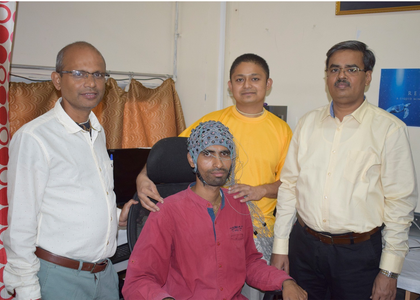Listening to Indian ragas can enhance attention, boost mental stability: IIT Mandi
By IANS | Updated: June 30, 2025 18:19 IST2025-06-30T18:13:17+5:302025-06-30T18:19:07+5:30
New Delhi, June 30 Amid rising mental health challenges such as stress, burnout, and attention deficits, a new ...

Listening to Indian ragas can enhance attention, boost mental stability: IIT Mandi
New Delhi, June 30 Amid rising mental health challenges such as stress, burnout, and attention deficits, a new study by the Indian Institute of Technology (IIT) Mandi on Monday showed that Indian classical ragas can potentially enhance levels of attention, emotional regulation, and mental stability.
The study, conducted in collaboration with IIT Kanpur, provides scientific validation for music as a therapeutic tool: one that is culturally resonant and non-invasive.
The research, which involved 40 participants exposed to the ragas, utilised advanced electroencephalogram (EEG) microstate analysis -- a real-time brain-mapping technique that captures momentary yet significant patterns of neural activity.
The findings, published in the journal Frontiers in Human Neuroscience, suggests that listening to Raga Darbari -- known for its soothing and uplifting qualities -- before exams or important meetings may improve focus, while Raga Jogiya -- a melancholic melody -- could help manage emotional overwhelm or grief.
The shifts observed in neural activity were not random, said first author Dr. Ashish Gupta, Assistant Professor, IIT Mandi.
“The data showed repeatable, consistent transitions after exposure to the ragas, suggesting Indian classical music can serve as a powerful tool for mental wellness. The EEG data consistently showed how music exposure, compared to silence, shifted the brain into more stable and functional patterns,” added Gupta.
The EEG test employed small metal electrodes, known as “microstates”, which often last only a few milliseconds and represent the brain's transient modes of operation, such as attention, emotional engagement, or mind-wandering.
Brain cells communicate through electrical impulses, and this activity is represented as wavy lines on an EEG recording.
The research revealed that Raga Darbari and Raga Jogiya can fundamentally alter EEG microstates, and show fleeting but powerful neural patterns that reflect attention, emotion, and cognitive processing.
“EEG microstates offer a window into how the brain operates moment, attention, mind-wandering, or emotional engagement. What we found was that Ragas don’t just evoke feelings, they actually reprogramme the brain in real time, it is remarkable to see how these ancient melodies consistently guide the brain into more stable and focused patterns,” said Prof Laxmidhar Behera, Director, IIT Mandi.
The study also observed an overall increase in brain stability across participants, with microstates becoming longer and more grounded, indicating a calmer, more focused mind.
Disclaimer: This post has been auto-published from an agency feed without any modifications to the text and has not been reviewed by an editor
Open in app